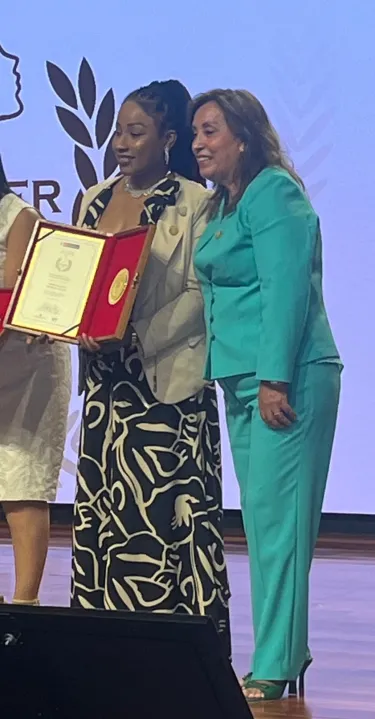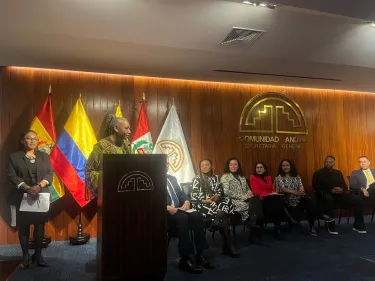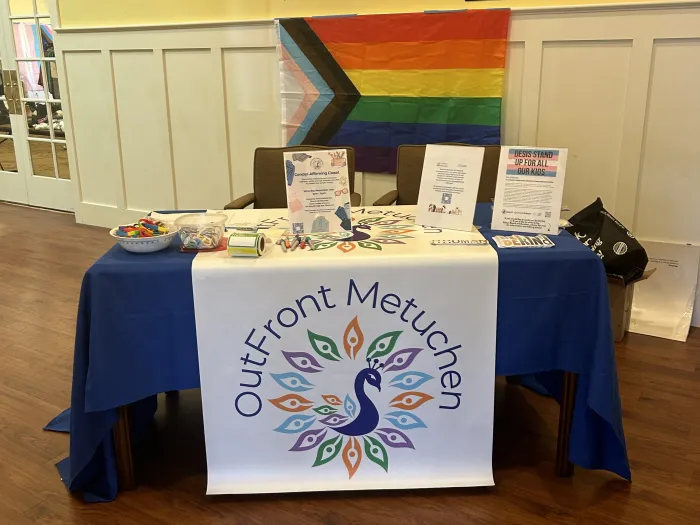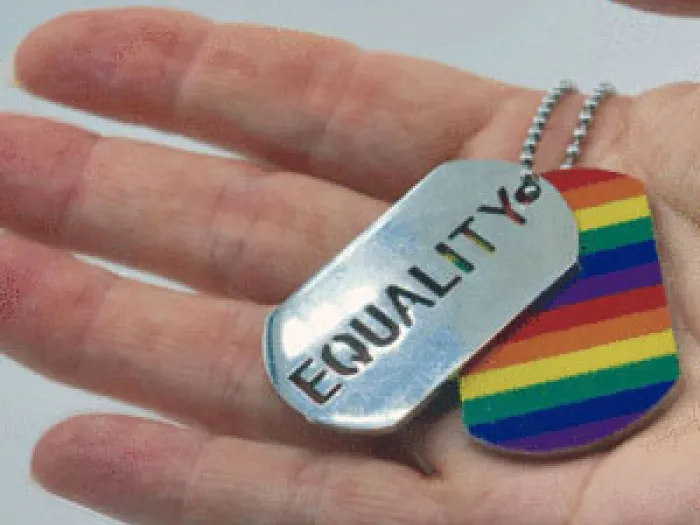Partner in Afro-Peruvian justice wins national award
Narda Mendoza is recognized for her work on behalf of Afro-Peruvian women

On March 6, Narda Mendoza was recognized by the government of Peru for her anti-racism and gender equality work. Mendoza works with Centro de Desarrollo de la Mujer Negra Peruana (the Center for the Development of Black Peruvian Women or CEDEMUNEP), a member organization of the Peru Joining Hands Network and a partner organization of the Presbyterian Hunger Program and several churches of the Presbyterian Church (U.S.A.).

Mendoza said that receiving the 2025 Order of Merit for Women filled her with pride and gratitude. “As an Afro-Peruvian woman, this recognition is a testament to the tireless work we have been doing for years, promoting gender equality and the empowerment of women, but particularly of Afro-Peruvian women,” said Mendoza. “This award not only makes my work visible but also motivates me to continue working tirelessly to make a positive difference in the lives of Afro-Peruvian women, girls and adolescents.” Mendoza said she feels committed to continuing the work of empowerment because “the sky is the limit” and she hopes to inspire others to “persist, resist and never give up.”
“This decoration of the Order of Merit for Women is the highest recognition that the Peruvian state grants to women who stand out for defending and promoting equal opportunities in the country,” Mendoza told the Rev. Jed Koball, a Peru-based mission co-worker of the Interim Unified Agency of the PC(USA). “I feel honored to be part of this community of women who work tirelessly for a more equal and fair future.”
In its 22nd year, the Order of Merit for Women was given to 13 recipients this year. Mendoza was the only one working on behalf of Afro-Peruvian women. Mendoza’s work at the intersection of race and gender and the work of her organization in the understanding of the history and status of Afro-Peruvians have also made her an important partner for the Center for the Repair of Historic Harms in the Interim Unified Agency of the PC(USA).

In August 2024, the Rev. Jermaine Ross-Allam, director of the Center for the Repair of Historic Harms, traveled to Peru and presented at the Regional Dialogue of Afro-descendant Women to Promote Our Empowerment and Achieve Ethnic-Social Justice to speak about the history of reparations for the historical harm of slavery in the United States and his proposal for an international solidarity network of the pan-African diaspora, known as AIRRE or the Alliance for International Repair and Reparations Ecumenical.
Ross-Allam met with Mendoza; her colleague, Cecilia Ramírez, director of CEDEMUNEP; and Oswaldo Bilbao Lobaton, director of the Centro de Desarrollo Étnico, to learn how best to support the education and reparations efforts of Afro-Peruvians in naming the historic harms particular to their context and the best process for repair. One outcome of this meeting was the sponsorship of the forthcoming book “Reparaciones y Pueblo Afroperuano — Desarrallando Linea de Base para La Accíon” (“Reparations and Afro-Peruvian People — Developing a Baseline for Action”), for which Ross-Allam wrote the introduction.
“One of the original sociopolitical and ecclesial crimes that Peru shares with the United States,” Ross-Allam writes in the book’s introduction, is that of “conceiving and corrupting a nation born of the union of anti-Blackness and racial capitalism.”
“Reparaciones y Pueblo Afroperuano, therefore, returns to the scene of the original crime and exposes the lines of thought and paths of action that consistently produce unnecessary death, disease, poverty, obstruction, marginalization, and disillusionment for Afro-Peruvian women, men, and children,” Ross-Allam writes.

As director of CEDEMUNEP, Ramírez appreciates the partnership her organization has with the Presbyterian Hunger Program and the Center for the Repair of Historic Harms for the ways that strategic and collaborative alliances allow her and Mendoza to position “our voices, our demands and our contributions as Peruvian people” and as “Afro-Peruvian women empowering ourselves.”
“Our current situations have deep roots and are consequences of colonization and enslavement,” said Ramírez. “These very cruel and painful historical processes have left a very deep mark that continues to this day, and that is evident in the perpetuation of structural and systemic racism and ethnic and racial discrimination.”
“Working in partnership allows us to have the opportunity to unlearn and learn together where we can advance in giving answers not only with respect to the importance of historical reparations but also why, for what, for whom, with whom and how,” Ramírez said.
Through CEDEMUNEP, Ramírez continues to raise awareness of “the challenges that we Afro-Peruvians still face in areas such as health, education and employment, among others.” She hopes people of faith will understand how “historical reparations are an outstanding debt, to continue building a better country, less racist, less discriminatory, less violent, less sexist but more inclusive, more egalitarian, more equitable, where finally as Afro-Peruvian people we can achieve true racial justice, true social justice.”
“This reminds me of the famous phrase by Martin Luther King,” said Ramírez. “Injustice anywhere is a threat to justice everywhere.”
“Every sunrise finds new individuals and organizations waking up to the fact that the number of generations cursed to endure the colonial legacies of racial capitalism that we have collectively failed to end is, in fact, a finite number that decreases as members from each sector of the African diaspora respond in the affirmative to the call to reclaim the labor of our ancestors,” Ross-Allam writes in his book introduction. After he echoes Ramírez’s sense of the moral urgency of the issue, he simply states, “Now is the time.”
You may freely reuse and distribute this article in its entirety for non-commercial purposes in any medium. Please include author attribution, photography credits, and a link to the original article. This work is licensed under a Creative Commons Attribution-NonCommercial-NoDeratives 4.0 International License.




